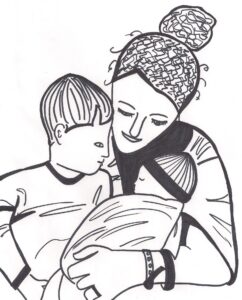Miriam is a PhD candidate in Prevention Science at the University of Oregon, mother of 3 girls, and striving to teach her girls that their voices matter.
Yikes, this chapter had parts of it that made me feel queasy. I don’t buy the idea that God would curse entire groups of people and that he would have other groups that he favored and considered His people. And I’m sure the image of cursing by coloring skin is not at all true but rather a product of explicit racism of the people writing the text.
The God I pray to loves all Their children and wants them all to feel that love.
So, I guess there are a few ways to go through this text: 1-skip it entirely; 2-work to find answers given the historical context to understanding why this text is so racist; 3-focus on a few small gems throughout the chapter. If you’re going for #1, no need to read on. If you’re going for #2, I’d love to see your notes! (I just don’t have time to study it that in depth right now). So this lesson plan focuses on #3 – the few small gems I found throughout the chapter – mostly taken out of the context of the story which I found so awful. I’ve put these gems into segments, meant to be read for family or individual scripture study in short bursts of scripture reading. My family usually spends about 5 minutes discussing one segment (and some nights we only get through half a segment).
Segment One: Jesus – full of grace and truth
- Moses 7:11 says that the Son is “full of grace and truth.”
- What does it mean to be full of grace and truth? As we strive to follow the Savior’s example, how can we have more grace and truth in our own lives?
-
- Anglican Pastor and author Tish Harrison Warren said in her book “Liturgy of the Ordinary: Sacred Practices in Everyday Life, “When we confess and receive absolution together, we are reminded that none of our pathologies, neuroses, or sins, no matter how small or secret, affect only us. We are a church, a community, a family. We are not simply individuals with our pet sins and private brokenness. We are people who desperately need each other if we are to seek Christ and walk in repentance. If we are saved, we are saved together–as the body of Christ, as a church. Because of this, I need to hear my forgiveness proclaimed not only by God but by a representative of the body of Christ in which I receive grace, to remind me that though my sin is worse than I care to admit, I’m still welcome here. I’m still called into this community and loved.”
- How can you have this grace and help others to feel that they are welcome and loved?
- Anglican Pastor and author Tish Harrison Warren said in her book “Liturgy of the Ordinary: Sacred Practices in Everyday Life, “When we confess and receive absolution together, we are reminded that none of our pathologies, neuroses, or sins, no matter how small or secret, affect only us. We are a church, a community, a family. We are not simply individuals with our pet sins and private brokenness. We are people who desperately need each other if we are to seek Christ and walk in repentance. If we are saved, we are saved together–as the body of Christ, as a church. Because of this, I need to hear my forgiveness proclaimed not only by God but by a representative of the body of Christ in which I receive grace, to remind me that though my sin is worse than I care to admit, I’m still welcome here. I’m still called into this community and loved.”
Segment Two: Zion
- Moses 7:18 is often quoted “the Lord called his people Zion, because they were of one heart and one mind, and dwelt in righteousness; and there was no poor among them.”
-
-
-
- Sister Reyna I. Aburto, Second Counselor in the Relief Society General Presidency asked this question, “Jesus Christ is the ultimate example of unity with His Father. They are one in purpose, in love, and in works, with ‘the will of the Son being swallowed up in the will of the Father.’ How can we follow the Lord’s perfect example of unity with His Father and be more unified with Them and with each other?”
- What are some ways that you personally can answer this question? What personal changes might need to be made in your life?
- Sister Reyna I. Aburto, Second Counselor in the Relief Society General Presidency asked this question, “Jesus Christ is the ultimate example of unity with His Father. They are one in purpose, in love, and in works, with ‘the will of the Son being swallowed up in the will of the Father.’ How can we follow the Lord’s perfect example of unity with His Father and be more unified with Them and with each other?”
-
-
Segment Three: When we are united, the Lord comes to us
- In this chapter, there was a lot of destruction going on, but in verse 16, it says that “the Lord came and dwelt with his people.” Personally, I believe that Heavenly Father and Heavenly Mother want us all to be a part of “Their people” – we just have to invite them.
- How can you let God dwell with you?
Sister Reyna I. Aburto continued her talk discussing the people on the earth who met Jesus (both in the New Testament and the Book of Mormon) and talked about what we can learn from them, “The Lord’s followers were one in purpose, in love, and in works. They knew who they were, they knew what they had to do, and they did it with love for God and for each other. They were part of a magnificent kaleidoscope moving forward with one accord…We can suppose that the reason why they were so united is because they knew the Lord personally. They had been close to Him, and they had been witnesses of His divine mission, of the miracles that He performed, and of His Resurrection. They saw and touched the marks in His hands and feet. They knew with certainty that He was the promised Messiah, the Redeemer of the world. They knew that ‘He is the source of all healing, peace, and eternal progress.’ Even though we may not have seen our Savior with our physical eyes, we can know that He lives. As we draw closer to Him, as we seek to receive a personal witness through the Holy Ghost of His divine mission, we will have a better understanding of our purpose; the love of God will dwell in our hearts; we will have the determination to be one in the kaleidoscopes of our families, wards, and communities; and we will minister to each other ‘in newer, better ways.’”
As God dwells with us, we’ll be more ready to serve others. How does this idea impact you?
Segment Four: Love one another
 In Moses 7:33 we are reminded of the commandment to “love one another.” Sometimes this is hard! We live in a very polarized world where it can be hard to love those that seem to have fundamentally different values, but it is still necessary. What are some ways you’ve been successful with reaching out in love to people that seem so different? (Please let me know in the comments, because I need to work on this a lot!)
In Moses 7:33 we are reminded of the commandment to “love one another.” Sometimes this is hard! We live in a very polarized world where it can be hard to love those that seem to have fundamentally different values, but it is still necessary. What are some ways you’ve been successful with reaching out in love to people that seem so different? (Please let me know in the comments, because I need to work on this a lot!)
In a speech at BYU, Sister Sharon Eubank said, “The big humanitarian crises that are going on right now and the ones that have happened in the past when people have been driven out of their homes and lands are, at the heart, failures to remember that we are brothers and sisters and that God is the Father of us all. That is the root cause of what is happening in the world. And when we respond in a humanitarian way, we can send bushels of food, we can dig wells, we can build latrines, we can put up schools and health care centers, and we can settle people into apartments. But if we don’t do something about people feeling like strangers instead of like our brothers and sisters, then the whole thing is in vain and will just feed the cycle of emotional and spiritual misery.”
Perhaps at times we’ve all felt like the stranger and at other times the one making others feel like strangers. What are some ways we can stop that?






4 Responses
Thank you so much for this, and for your voice.
“When we confess and receive absolution together, we are reminded that none of our pathologies, neuroses, or sins, no matter how small or secret, affect only us.” I love this quote. At least in the US, we sometimes value rugged individualism at the expense of community, and I think this ends up harming each of us individually as well as all of us as a whole. For me, part of meeting Christ is remembering to prioritize “the least of these” rather than those who sit in power and comfort. “Comfort the afflicted and afflict the comfortable,” seems to be how Christ worked.
Beautiful, thanks!
When I am unimpressed with the text, I usually go with your strategy here: choose the one or two verses that uplift, and just use those. I think it is a great strategy when the text is otherwise problematic.
Me too! Or a lot of times I just skip it.